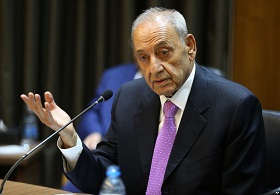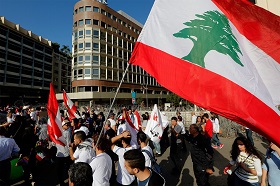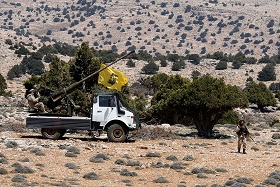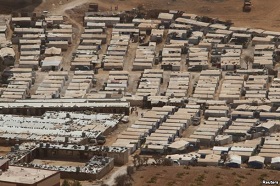The Lebanese political field does not seem to show any signs of a transition to a phased solution of the key problems facing the country – that is, the crisis of the legislative and executive branches, social security issues, economic hardship, unemployment, refugees, etc. Yet serious shifts are under way beneath the surface that seem to promise an early change of the landscape.
Lebanon’s Bipolar Sructure is Melting Down
It is time to admit that the habitual division of Lebanon’s leading political forces into two camps that appear to be on opposite sides of the barricades is not helpful when trying to sort out the events in this small country that is the key to understanding the Middle East. The parties within the March 14 and 8 March 8 alliances are increasingly seen to have more businesslike and trusting relations with their formal political opponents than within the alliance (as highlighted by the relations between Almustaqbal and El Marada). And, of course, the artificial principle of political affiliation on confessinal grounds does not work, at least not for Christians: the Maronites have long been members of both alliances and the Lebanese Orthodox believers are members of different parties on both sides of the ephemeral “March barrier.” The same is true (with some reservations) of Armenians. The key divisive factor – the memory of Syria’s presence in Lebanon – has long receded into the past. The relationship with one of the virtual regional blocs (pro-Saudi and pro-Iranian) is now more relevant, but it too does not correlate with the interests, for example, of Lebanese Christians and hardly corresponds to the internal Sunni–Shia relations.
Political life in Lebanon became noticeably more lively at the end of summer and autumn of 2016. In early October, the political world was shaken by the proposal of the Parliament Speaker Nabih Berri to make the election of the country’s president conditional on the prior agreement on the distribution of seats in the future government and on the principles of a new electoral law. The proposal of a “package deal” coming from a champion of electing a president early was met with protest in various Maronite circles.
The sharpest reaction came from the camp of Michel Aoun, which characterized the proposal as Nabih Berri’s attempt to block the election of General Aoun to the top post. Indeed, a row broke out in the government between the representatives of the Amal Movement and the Free Patriotic Movement (FPM) – Ministers Ghazi Zeaiter and Elias Bou Saab respectively. Incidentally, in September, the latter, together with FPM’s young leader, Foreign Minister Gebran Bassil (and apparently with the support of Dashnaktsutyun party) boycotted a cabinet meeting in response to the extension of the powers of Army Commander Jean Qahwagi, a decision the Movement opposed.
The protest against Nabih Berri’s proposal was joined by the head of the Lebanese Forces Samir Geagea who declared at a meeting in Bkirki that the initiative ran counter to the constitution and noted that Michel Aoun had not approached Saad al-Hariri with any kind of offer.
The Maronite Church was also outraged by the offer of a “comprehensive deal.” The Pontifical Council headed by Patriarch Bechara Boutros al-Rahi also assessed the Speaker’s proposal as unconstitutional and probably politically illegitimate.
However, Nabih Berri’s arguments were simple: the long-drawn-out political crisis was crying for an early solution, and agreement among the main forces on the presidential candidate was obviously linked with other key issues – the distirbution of portfolios in the future cabinet, compromise on the parliamentary election law and the appointment of key army and security ministers. Thus, the Speaker proposed to “settle the issue amicably” without waiting for a spate of further rows after the election of the president.
What prompted the long-time Amal leader, an experienced politician, to play so openly? Is there reason to expect early changes in Lebanon?
New Decisions on Old Initiatives
It is true that the main political parties and movements inside Lebanon have been more active recently. The Kataeb Party came up with a high-profile programme and its leader Samy Gemayel visited Moscow in late summer. The project of sweeping decentralization proposed by the falangists would divide the country into cantons along confessional lines and cover all the spheres of governance, as well as the system itself. Kataeb activists tried to score political points for their party by various means, including such unorthodox methods as picketing landfills and rubbish dumps in some parts of Beirut, apparently hoping to focus the attention of residents of central districts on the problem of the pollution of mountainous areas, which are traditionally inhabited by Christians.
Suleiman Frangieh, the leader of the Marada Movement and a representative of the Maronite dynasty who was nominated as a compromise presidential candidate in late autumn of 2015, has not given up his presidential ambitions. He says he would never yield to his powerful rival, Michel Aoun; incidentally, both candidates officially belong to the March 8 Alliance.
By contrast, another prominent Maronite leader who had his eyes on the presidency, Samir Geagea (of the March 14 Alliance), has practically withdrawn from the race in favour of General Michel Aoun. A year-and-a-half of intense rivalry ended in January 2016 with the Lebanese Forces party declaring that Michel Aoun should be president. The main intrigue thus revolves around the possible election of Michel Aoun to the top post, which is still reserved for the Maronites. All signs point to the fact that he has the support of the respected Sunni politician Saad Hariri.
The leader of Almustaqbal party continues to insist on the need for an early agreement on the presidential candidate, and Hariri’s idea now sounds in absolute unison with the wishes of Michel Aoun (who was to blame for the disruption of all 40 or so parliamentary sessions that were convened to elect a president). If it is true that these politicians from different camps have indeed made some kind of deal, then the following statement by Ibrahim Kanaan, member of parliament and part of the inner circle of the FPM’s founder, would not come as a surprise: “We are witnessing a very positive initiative by Hariri to solve the presidential vacuum... thus we call on rival political factions to allow his efforts to succeed.”
Incidentally, in early October Saad Hariri met with Minister of Foreign Affairs of the Russian Federation Sergey Lavrov behind closed doors in Moscow, where he probably discussed the internal Lebanese agenda. There is no doubt that Russia would like to see a speedy resolution to Lebanon’s main domestic political problems, since they are closely linked with the Syria problem. This is borne out by other close contacts of Lebanese circles (including those linked to the FPM) with special representative of the President of the Russian Federation to the Middle East and Africa, Deputy Foreign Minister Mikhail Bogdanov.
“Lebanese Syrians:” Let Them Stay or Send Them Back?
Meanwhile, the focus remains on the Syrian crisis and its immense impact on the neighbouring Lebanon. First, Islamists continue their attempts to undermine the fragile equilibrium in Lebanon. This includes individual militant groups crossing the border – groups that the Lebanese army is fighting with effective help from Hezbollah units. Second, isolated incidents involving members of large terrorist groups fighting in Iraq and Syria are taking place in the interior regions of Lebanon. Increasingly, these people target Palestinian camps (especially the Ain al-Hilweh camp, where a mutiny broke out in the summer of 2007). Third, there is the problem of refugees from Syria, Iraq and Palestine. Only around 1.1 million of them have been registered, but their total number, according to the most conservatie estimates, is over 1.7 million. An high-profile French statistical agency put the total population of Lebanon at 6.2 million in 2015.
One might have expected the sharp growth of the number of refugees in the country to provoke widesread protests among the local population. But this has not been the case, as the people have sympathy for them. However, discontent is expressed over the inaction of politicians in ensuring that the refugees return to their home countries. The Lebanese people legitimately fear that the stay of the refugees, who make up more than a third of the population, will be prolonged, a burden the country’s economy would be unable to sustain. In addition, this would complicate social relations and make the country more financially dependent on international institutions.
Still, plans for the phased return of refugees to their home countries are being announced, provoking, the usual storm of criticism. The plans are advocated above all by Foreign Minister Gebran Bassil (the head of FPM) and Labour Minister Sejaan Azzi (Vice President of Kataeb). The latter is the author of a two-year programme to return refugees to their places of residence as hostilities there come to an end. The leaders think that any suggestions of naturalizing refugees and giving them permanent jobs, allegedly coming from various international organizations, including the World Bank and the International Monetary Fund, should be rejected. Characteristically, local representatives of the UNHCR and Human Rights Watch are the main critics of the initiative put forward by Maronite politicians.
Meanwhile, clashes beween the locals and refugees are already taking place (for example, the incident on September 20, 2016 at Dawhat Aramoun, 22 kilometres south of the capital). Unless coordinated decisions are taken, further politicization of the Syrian refugees issue can be expected. The overwhelming majority of the refugees are Sunni Muslims and, of course, Christian leaders cannot be indifferent to the dramatic fall of the share of Christians in the country due to the influx of Muslims from abroad.
For the Good of Lebanon?
The question remains as to whether presidential candidate Michel Aoun, who has garnered a lot of support, has a coherent political programme. At first glance the answer has to be yes, he has. For example, he is advocating his own version of the electoral law reform proposed in its time by the Orthodox Assembly, which now boils down to this: the country is a single constituency and elections are held according to confessional quotas. Equally drastic measures are proposed with regard to the refugee problem, social reforms and other high-priority matters. However, many of these proposals have prevented him from being approved as s candidate, including by “foreign partners.” Therefore, Michel Aoun’s controversial, overly independent and even unpredictable figure may, in the eyes of his enemies, including those abroad, have a negative impact on the country’s future if he is elected.
The people of Lebanon have been waiting far too long for its rulers to make decisions on the pressing issues in the life of the country in the extremely complicated regional conditions. Let us hope that the exit from the drawn-out political impasse will not be contradictory, that it will not exacerbate social relations in the country, and that it will not affect Lebanon’s position in the world. Perhaps the signs of a commitment to finding a consensus within the country owes something to fact that outside pressure has eased somewhat. Could it be that it is somehow connected with the ambiguous position in which Saudi Arabia (the main ally of March 14) found itself as a result of the fighting in Yemen? Or perhaps it is an indirect reflection of the West’s attempt to get political mileage out of the contraditions between Iran and Saudi Arabia? This is borne out by the rumblings of discontent among pro-Sunni analysts, notably from Alsharq Al-Awsat. In any case, the important thing is that the dynamic intercommunal equilibrium in Lebanon remains stable in the face of external challenges and that the geopolitical factor mixed with religious implications does not exert a destructive influence on this sturdy state.








